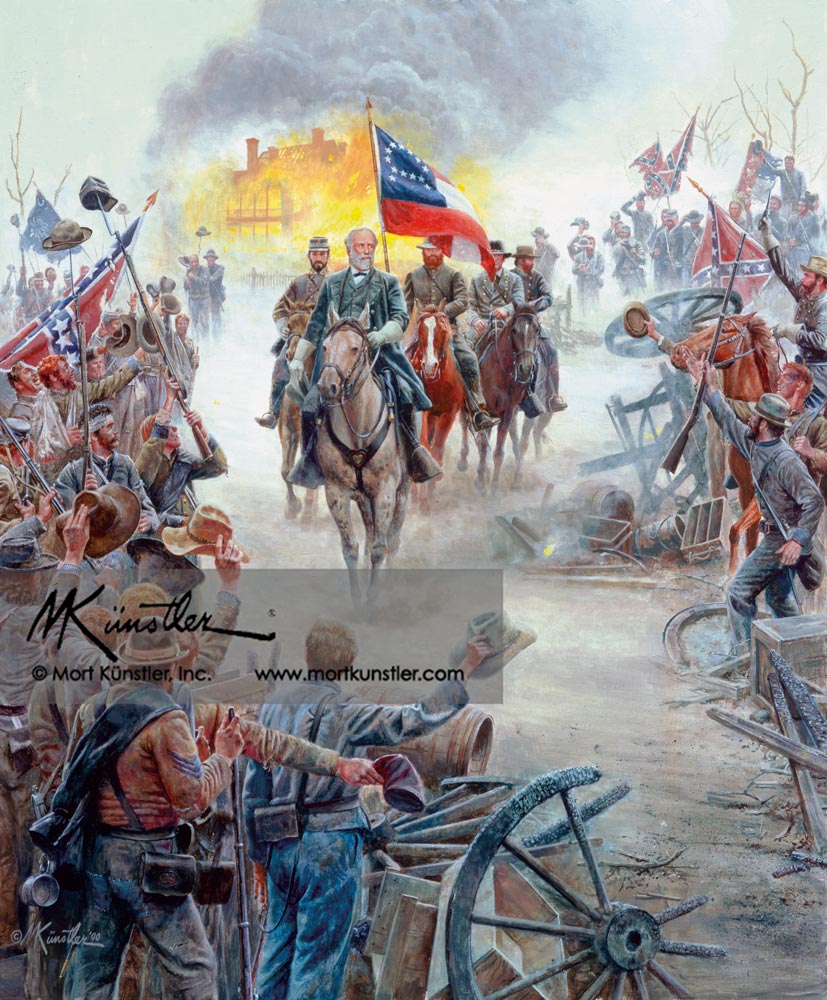The Official Mort Künstler Website
His Supreme Moment - limited edition print
His Supreme Moment - limited edition print
Lee at Chancellorsville, May 3, 1863
Couldn't load pickup availability
Custom framing is available for this print. Please call 800-850-1776 or email info@mortkunstler.com for more information.
LIMITED EDITION PRINTS
Paper Prints
Reproduction technique: Fine offset lithography on neutral pH archival quality paper using the finest fade-resistant inks.
Each print is numbered and signed by the artist and accompanied by a Certificate of Authenticity.
Image Size: 26¼” x 22” • Overall Size: 32¼” x 27”
Signed & Numbered • Edition Size: 1,150
Signed & Numbered Internet Edition • Edition Size: 50
Signed Artist’s Proof • Edition Size: 50
Historical Information
Again, he had turned disaster into triumph. A day earlier, General Robert E. Lee and his Army of Northern Virginia had faced potential destruction. In the forest thickets west of Fredericksburg, Virginia, near the rural crossroads of Chancellorsville, General Joseph Hooker and the Army of the Potomac had sought to envelop and destroy Lee’s army. Hooker’s strategy was sound, his army was much larger and better equipped, and he was confident of victory. “My plans are perfect,” he had boasted, “and when I start to carry them out, may God have mercy on General Lee, for I will have none.”
As Hooker moved to crush Lee’s army, however, Lee learned of an unprotected route through the woods that might allow him to unleash a surprise assault on his enemy’s right flank. Departing from basic military doctrine — never divide your force in the face of a superior enemy — Lee sent General Stonewall Jackson and 30,000 troops on a day-long forced march to set up the flank attack. It was a dangerous risk: Lee was left with barely 15,000 men to hold off the Federal advance. He deceived and stalled Hooker by feigning an assault — buying the time needed for Jackson to organize and launch his surprise attack.
That afternoon, May 2nd, Jackson’s troops charged screaming from the forest and struck Hooker’s right flank a mighty blow that sent the Federal XI Corps reeling in retreat. Instead of the success he had proudly predicted, Hooker was dealt the same humiliating defeat that Lee had inflicted on the previous Federal army commanders. It was a might victory for Lee and Jackson, but it was a costly one: Stonewall Jackson would soon die of complications from battle wounds suffered at Chancellorsville. Looming ahead, too, was the battle of Gettysburg and the death of Southern dreams. For the moment, however, the Army of Northern Virginia was again victorious. As he moved among his army near the blazing Chancellor house the next morning, General Lee was mobbed by his cheering troops. Again, they had done the impossible. Again, they had turned back the invader. The triumph at Chancellorsville was Robert E. Lee’s supreme moment.
Mort Künstler’s Comments
Some paintings take years to develop. I did a painting of His Supreme Moment in 1995. More than five years later, I liked the subject so much that I decided to paint it again as a vertical composition. I left the right foreground without figures to lead the eye into the main center of interest, Robert E. Lee. In checking with park historian Frank O'Reilly of Fredericksburg and Spotsylvania National Military Park, I learned that regiments from Virginia, North and South Carolina, and Georgia were at the Chancellor house at the moment Lee rode by. This gave me the opportunity to show the South Carolina flag in the left background and the North Carolina flag in the right background. In addition to the Confederate battle flag, Lee’s headquarters flag can be seen.
The Chancellor House, aflame in the background, is based on drawings of the house done before the war which were made available to me by Janice Fry, the librarian at the Fredericksburg and Spotsylvania National Military Park.
Dr. James I. Robertson, Jr. describes the scene clearly in his biography Stonewall Jackson: “Lee appeared at the front. Weary Southerners – some blackened by smoke, others limping from wounds – yelled hysterically at the sight of their leader. A staff officer commented, ‘I thought that it must have been from such a scene that men in ancient days rose to the dignity of the gods.’”





